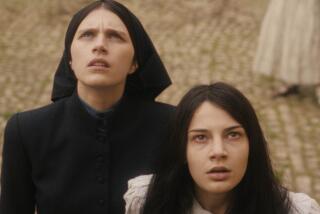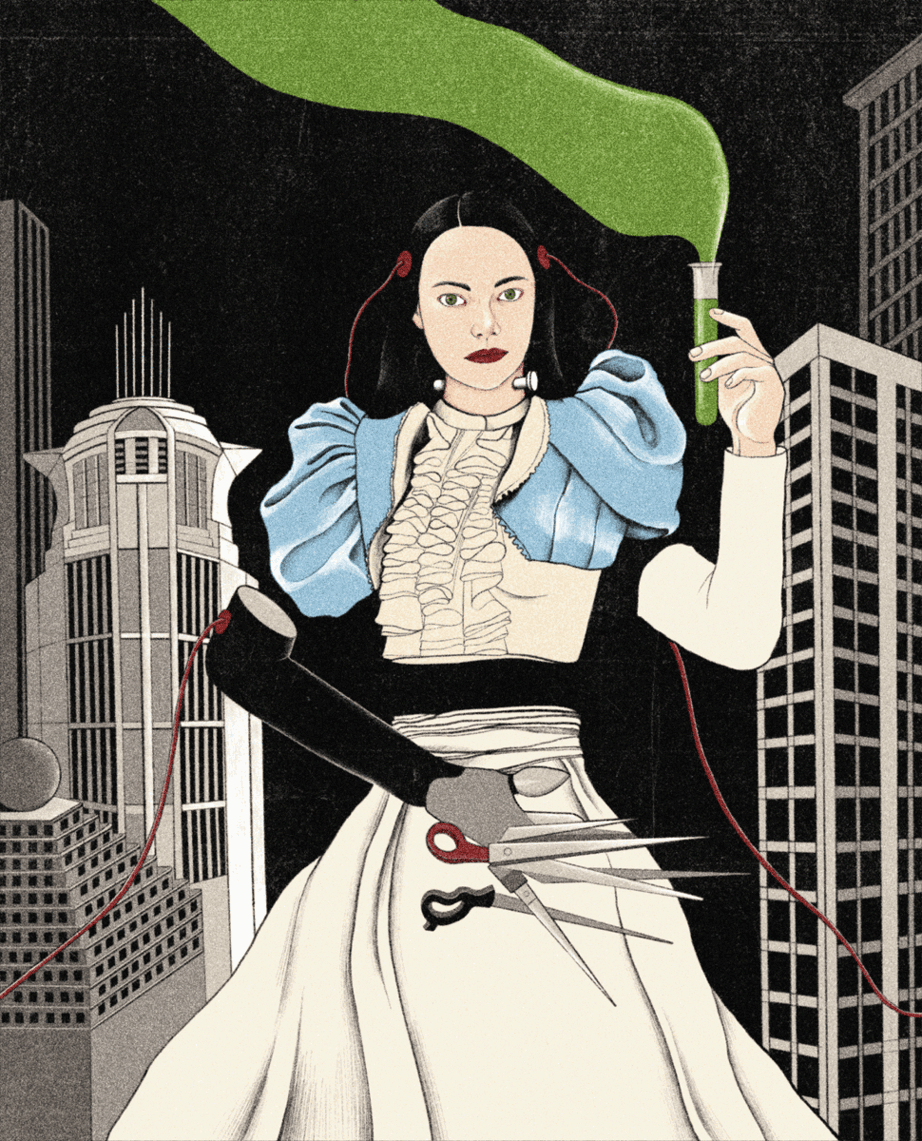Review: Zombies are the threat in the dark fairy tale ‘Endzeit — Ever After’
Any story about a girl in the woods is replete with foreboding. In Carolina Hellsgård’s “Endzeit — Ever After,” a fairy tale set two years after the apocalypse, a frightened girl and a desperate woman venture into the forest because it is their best chance for survival. They meet no beguiling wolf — but there are zombies.
At the beginning of this beautifully crafted film, an intertitle explains that a plague has decimated the population of the world. Only the inhabitants of two German cities have been spared. In Jena, scientists are seeking a cure; in Weimar, the infected zombies are shot on sight. The first allusion to the environmental origins of the pandemic is a solar panel atop Weimar’s famous Goethe-Schiller Monument, connected to dozens of batteries crowding its plinth. Over this establishing shot a girl is heard whispering a strange incantation. It is Vivi (Gro Swantje Kohlhof), who lives in a psychiatric ward. In her prim white blouse and skirt, she appears destined for some peril that will undo that neatness.
Brief, impressionistic flashbacks reveal the reason for Vivi’s hospitalization: she has hallucinations, the result of her guilt over failing to rescue her younger sister from the zombies. A nurse tries to cheer Vivi with the offer of red hair dye. Surprisingly, it does not improve her mood, but the color of that dye, and its effect on Vivi’s appearance, evokes an iconic fairy tale. German screenwriter (and graphic novelist) Olivia Vieweg would know “Little Red Riding Hood” as “Rotkäppchen” or “Red Cap.” The Grimms’ version ends with a vivisection, the huntsman releasing the girl and her grandmother from the wolf’s belly. “Vivi” is a conjugated form of the Latin vivus, “living.” “Ever After” is a story about death and rebirth.
Vivi takes a job maintaining the protective fence that encircles the city. There she is placed under the supervision of Eva (Maja Lehrer), who feels an immediate dislike of her new charge, in part because of what she perceives as the girl’s affectation. Vivi is still clad in her white blouse. Eva wears a sleeveless shirt that exposes her muscular beauty. A supply train from Jena rattles into view in the distance, at the edge of the forest, as the pair look on. Suddenly, a zombie rushes the fence and a co-worker is bitten; Eva is compelled to kill her. That is when the redhead finally lives up to her name, although Hellsgård’s direction works against Vieweg’s feminist characterizations and intent.
Vivi escapes the hospital, boards the train, and then discovers she is not alone. Eva is also headed for Jena, but with no plans to befriend Vivi. Eva’s name, the Latinate of Eve, prefigures her role in the post-apocalyptic world. Dense foliage slaps against the windows of the train, until it enters a meadow, and sunlight brightens the car. Then, the train stalls. The alternating light and darkness here, and throughout “Ever After,” is a wonderful leitmotif for the women’s labyrinthian path, the journey of heroes. Its clever counterpoint is Bach’s somber Cello Suite No. 2. That score echoes Eva’s view of the apocalypse, that Mother Nature has delivered her eviction notice to humankind.
Eva and Vivi are soon compelled to journey into the forest together. Eva finds a pair of sneakers to replace Vivi’s open slippers. She also tosses the girl’s sleeping pills. Women’s reclamation of the Earth and its woodlands requires outfitting, and a new, vigilant role as guardians. Hellsgård’s direction undermines the ritual and portent of Eva’s actions, but the excellent performances nevertheless convey their significance. With the exception of a few frightening zombie moments, much of what unfolds in the forest is discovery, and a surprising transformation. In the mythical domain of Artemis, in the “ever after,” women and girls no longer have anything to fear.
-------------
‘Endzeit — Ever After’
In German, with English subtitles
Not rated
Running Time: 1 hour, 30 minutes
Playing: Starts June 28, Laemmle Royal and Laemmle Glendale
------------
More to Read
Only good movies
Get the Indie Focus newsletter, Mark Olsen's weekly guide to the world of cinema.
You may occasionally receive promotional content from the Los Angeles Times.






